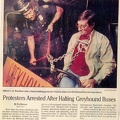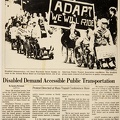Disabled Protesting Lack of Access to Buses Win Partial Victory
from page B1 [we don't have part one of this story]
...it was the best they could hope for at present and agreed to stop blocking the building's doors and elevators. More than 100 people, most of them in wheelchairs, participated in the protests Monday and Tuesday.
ADAPT members had planned to maintain a symbolic presence at the building after the agreement was reached, but no protesters were visible inside the facility Tuesday night.
Authorities had attempted to eject protesters from the building Monday evening, but President Bush intervened and let them spend the night inside rather than send them out into the rain.
During the lunch hour Tuesday, before the settlement was reached, tensions escalated between demonstrators and the building's employees. Protesters blocked elevators on the plaza level, forcing office workers and visitors to climb the stairs in the 26-story building.
Security guards, who until then had stood by and watched, donned blue surgical gloves and forcibly removed some protesters from the elevators so people could pass.
Having equal access to public transportation is a goal disabled people say they have fought years to attain. By denying able-bodied people access to the federal building was a way of underscoring the barriers they have in their daily lives, protesters said.
But some people viewed the demonstration as an inconvenience and not as a tactic to gain rights for the disabled.
"l wasn't their momma, and I didn't have them and l'm not God, so why do I have to put up with this?" argued one woman.
Rhonda Lester of Denver, whose 5-year-old son was among the protesters, got into a face-to-face shouting match with her. After security officers stepped in, Ms. Lester said she understood the woman's point. "But she has to understand ours," she said.
“Where would blacks be without protests?“
Although 35 percent of the nation's 50,000 buses have wheelchair lifts, handicapped persons say, they sometimes have to wait at a bus stop for an hour before one comes by with a lift or a bus driver who knows how to operate it.
- Created on
- Friday 12 July 2013
- Posted on
- Wednesday 8 April 2015
- Tags
- accessible transit, ADAPT 1989, protest, Rhonda & Kenny Lester, Richard B Russell Federal Building
- Albums
- Visits
- 1607
- Rating score
- no rate
- Rate this photo


0 comments